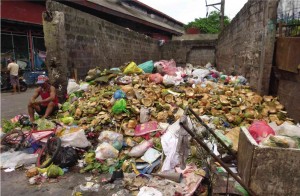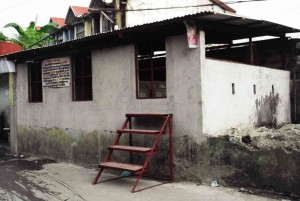Green campaign finally closes 30-yr-old dump in Caloocan

THEN AND NOW A composting shed for biodegradable wastes (lower photo) has been built in place of a stinky, disease-causing dump near a wet market in Barangay 34, Caloocan City, thanks to a campaign that convinced the local government and a cooperative of the need for proper solid waste management. CONTRIBUTED PHOTO
After more than 30 years, an open dump—only a few steps away from Maypajo Market on Estanislao Street in Barangay 34, Zone 3, Caloocan City—finally disappeared. After stinking for so long next to residential areas and the Isla San Juan river, it was closed in September, on Friday the 13th.
It was a lucky date indeed for residents profuse with gratitude. Standing now on the cleared site is a composting shed put up by Bangon Kalikasan Ecology Centers (BKEC) with the endorsement of and in close coordination with the Department of Environment and Natural Resources-Environmental Management Bureau (DENR-EMB). The shed was built for the biodegradable wastes coming from the market to be turned into organic fertilizer.
Coop’s resolution
After several meetings and an orientation program on ecological waste management, BKEC succeeded in prodding the officials of Maypajo Market Multi-Purpose Cooperative (MMMPC) to come up with a resolution, present it to the barangay chair, and finally get rid of the dump everyone has been complaining about since the 1980s. Residents, some of whom contributed one way or another to the emergence of that dump, recalled how toxic emissions caused many in the community to fall ill; at least one minor reportedly died as a result.
Before, an ever-rising mound of garbage filled the approximately 60-square-meter containment area, the filth partly hidden from view by a high wall. Whenever it came close to overflowing, the trash was hauled off in trucks.
Article continues after this advertisementBut today, the foul smell is gone since there is no more garbage beside the homes. It elated Stella Tasic, a resident and MMMPC board member.
Article continues after this advertisement“We learned only recently when the hauler came to collect all the garbage that, besides our barangay and at least two others, some barangays in (neighboring) Manila were also dumping their trash there,” Tasic noted.
 The Maypajo Market is just one of the 17 (one in each local government unit in Metro Manila) where Bangon Kalikasan, with help of DENR-EMB-National Capital Region, is conducting education campaigns for waste segregation, composting and recycling. The project has gained the support of some mayors and barangay chairs, who are being encouraged to close all open dumps in their jurisdictions.
The Maypajo Market is just one of the 17 (one in each local government unit in Metro Manila) where Bangon Kalikasan, with help of DENR-EMB-National Capital Region, is conducting education campaigns for waste segregation, composting and recycling. The project has gained the support of some mayors and barangay chairs, who are being encouraged to close all open dumps in their jurisdictions.
About 60 percent of wastes generated daily from public markets, households and business establishments are biodegradable. If these are turned into compost and used as organic fertilizer, waste collection will be greatly reduced and organic gardening and farming will be encouraged.
Compost buyer
In the case of Maypajo, MMMPC chair Brigido de los Reyes has agreed to buy the compost from the market for his farm. That would mean added income for his cooperative, he said.
Composting and ecological waste management can put a stop to the unsound practice of dumping waste into rivers and creeks, beside which many wet markets in Metro Manila are located. If widely done in urban areas, they could eliminate the need to reintroduce incineration or burn technology—which add to global warming and toxic emissions in the atmosphere—as some groups are now attempting to do through the local governments.
The practice would also speed up Environment Secretary Ramon Paje’s call for full compliance with Republic Act No. 9003, or the Ecological Solid Waste Management Act. It has been more than a decade since the law was passed in 2001 but garbage continues to increase. Composting will also promote the DENR’s National Greening Program.
Aside from the one in Maypajo, Bangon Kalikasan has also put up composting sheds in five cities and one municipality in Metro Manila; another is currently being built and five more are lined up for construction.
Not only those found in markets but all dumps must be closed in accordance with the law of the land and of nature. Garbage in the streets, rivers, creeks and coastal areas clog waterways and aggravate natural and man-made calamities that have killed thousands of Filipinos, including children to whom we are supposed to bequeath a cleaner, safer environment.
The United Nations-Intergovernmental Panel on Climate Change called on governments in 2007 to carry out dramatic, drastic, significant actions to mitigate the effects of global warming and climate change. We can help by acting right in our own homes, communities and markets. What is happening to us now is not a joke.
The authors are founders of the Bangon Kalikasan Ecology Centers and Bangon Kalikasan Movement.